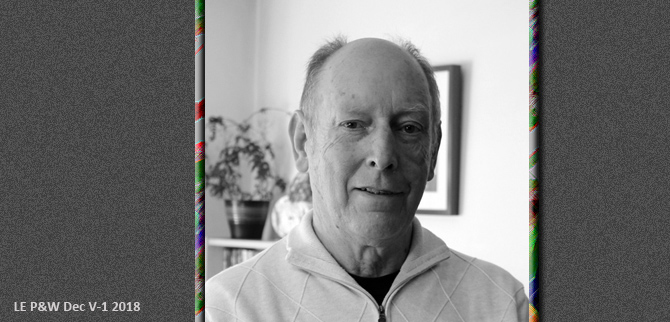Talking Art, poems by Michael Durack
His poems have appeared in publications such as The Burning Bush, Live Encounters, Electric Acorn, The Cafe Review, The Stony Thursday Book and Poetry Ireland Review, as well as airing on Irish local and national radio. He is the author of a memoir in prose and poems, Saved to Memory: Lost to View. With his brother, Austin, he has recorded two albums of poetry and guitar music, The Secret Chord (2013) and Going Gone (2015.) His poetry collection, Where It Began, was published by Revival Press in September 2017. Michael lives in Co. Tipperary, Ireland.
[one_half]
Talking Art
We talk Art,
blather about painting, pottery, sculpture;
appraising its subject matter – mythology,
saints and nudes, the natural world.
We talk Renaissance, Fauvism, Op Art;
mull over movements, schools and styles.
Challenged to name a favourite work,
you choose Michelangelo’s gut-wrenching Pieta;
and, feeling the tug of my agricultural roots,
I pick Van Gogh’s Basket of Potatoes.
Is there a hierarchy of Art?
Which one has chosen the better part?
Pieta? Potatoes?
Potatoes? Pieta?
Let’s call the whole thing off.
[/one_half]
[one_half_last]
Pond Field
The motorway has cut the ground from under
headland and tillage field, leaving root crops
without soil to cling to, weeds a wasted space,
beetle and worm casting about for work,
ploughshare and harrow pins redundant,
the hoe cast down, the trowel thrown in,
the rat sniffing in vain for potato pits
by a road turned fly-over bridge.
Horse hooves stamp furrows of air, the rooks
surveying scarecrow fields of black tarmac.
The pond, lifted from its soggy bed,
is high and dry; farm house and sheds
of rusted galvanize peer over limestone cliffs
and see only traffic and coloured boards
signalling junction, lake drive, heritage towns.
[/one_half_last]
[one_half]
Open
The wicket gate was open.
She said he left the gate open.
He left the wicket gate open.
Protestations that he did not leave the gate open
met with incredulity.
He said he never opened the gate.
He said he climbed over the gate.
And why did he climb over the gate?
Because he was capable of climbing over the gate.
Because it was as easy to climb over the gate.
Because it would mean not opening the gate.
And why would a man of four score years
climb over a low gate?
Because he could, because he did.
The wicket gate was open.
And how did the gate come to be open?
Surely the gate did not open itself?
He denied opening the gate.
His denial infuriated her.
Her intransigence distressed him.
Nothing passed through the opened gate,
nothing gained admittance, nothing was granted egress.
For there was nothing for the gate to bar,
nothing to enclose, nothing to keep out.
Nothing was confined or excluded except these two,
she the incredulous, he the disbelieved,
wounds opening like the gaping wicket gate.
[/one_half]
[one_half_last]
Blood Relatives
At the Blood Donor clinic
we queue
for a queue
for a queue
like customers in a Soviet store,
stoically shuffling towards the silver or the gold pelican.
A foliage of Christmas decorations droops
above an undergrowth of tubes and receptacles,
folding beds and white-frocked medics.
Here is society (prostrate) in microcosm:
the farmer rolling up his sleeve for a spot
of arterial drainage; a barmaid on leave
from the Labour In Vein, blood vessels brimming;
the bank manager stretching out an arm
to make a liquid deposit,
crepuscular figures waxing corpuscular.
Later, at the refreshment table we unwind,
all on the same team, accentuating our (O) positives,
strangers, friends, neighbours, blood relatives.
[/one_half_last]
[one_half]
Bicycles on Damstraat
Lounging on Damstraat, white wine, hot sun
dangling above Ripley’s Believe It Or Not;
bicycles canter by like ponies on a carousel,
high nellies with mudguards and north road handlebars;
and riders upright and stately, ploughing the cobbles:
men in shorts and jeans with not a trace of lycra,
and women in hijabs and business suits,
oblivious of bubble blowers, pigeons and jugglers;
of Nieuwe Kerk bells pealing Holst’s Jupiter;
of shoppers streaming from Rokin and Kalverstraat,
and teenagers larking by the National Monument.
Their eyes on the cycle lane, the red and the green lights;
their faces impassive, focused, relaxed;
their hands grip the bars or cup phones to their ears;
their minds turn to fantasies, office, or home;
their legs spin the pedals towards small humpback bridges
over Singel and Heren and Keizer and Prinsen,
destined for Jordaan or Vondelpark.
We stare until time signals time to go
to hotel, Centraal, Schiphol and home,
where MAMILs on aerodynamic machines
will check for PBs on their mini-computers.
worlds from Amsterdam’s merry-go-round
[/one_half]
[one_half_last]
[/one_half_last]
© Michael Durack


